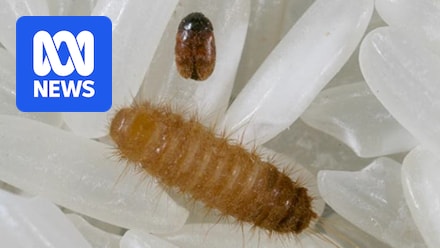The Australian government has estimated the cost of khapra beetle to Australia’s grains industry at more than $15 billion if it became endemic across the country.
The invasive grain pest was discovered in imported nappy pants on September 7.
Australia is currently free of khapra beetle, which the Department of Agriculture, Fisheries and Forestry (DAFF) has listed as the number one priority pest for grains, and if the beetle became established would severely impact Australia’s grain exports.
Investigations are continuing into how khapra beetle larvae came to be in a box of Little One’s Ultra Dry Nappy Pants in walker size five.
Efforts are continuing to recover all pairs of nappy pants that could contain the larvae or beetle, about a third of which were distributed to Woolworths stores in regional NSW.
DAFF said it was vital to contain the beetle.
“It’s estimated it would cost the country conservatively $15.5 billion over 20 years if it was to establish,” said Australia’s chief plant protection officer Gabrielle Vivian-Smith.
Dr Gabrielle Vivian-Smith says the khapra beetle is a notorious hitchhiking pest. (Supplied: Department of Agriculture, Fisheries and Forestry)
While the larvae of the beetle, which is endemic in other countries, was found in the nappy pants imported from Spain, Dr Vivian-Smith said they probably came from another country via the container ship.
“Spain isn’t a khapra beetle country and khapra beetle is a notorious hitchhiker pest,” she said.
“Often it’s found contaminating shipping containers where it can survive for long periods of time without very much food. It’s quite an opportunistic beetle.”
Most products recovered
Dr Vivian-Smith said the trace back and call backs from consumers had been very helpful.
“We are working closely with Woolworths, with state and territory governments and the key industry bodies to ensure all goods associated with the shipment have been traced and secured,” she said.
“They’ve all been removed from the Woolworths stores that they were consigned to, but some have been purchased.
The tiny adult Khapra beetle (top) and juvenile larvae (bottom) pictured on grains of rice. (Supplied: DAFF)
“The public are being asked to not use the goods, to not dispose of the goods or their packaging, and to not return the goods to the store.
“Double bag the goods using plastics or zip lock bags and seal those bags with tape, and if you can place them in the freezer and then don’t move them to prevent spread.”
Customers can contact the Department of Agriculture, Fisheries and Forestry on 1800 798 636.
Landfill fears
Agricultural analyst Andrew Whitelaw said it was possible nappy pants could already be sitting in landfill with khapra beetle larvae in them.
“What scares me most about it is the method it’s coming in. It’s a good news story that we have found this khapra beetle and know it’s there, but how many others have got through?” he said.
“Things do get through invariably. At some point a biosecurity issue will get into the country.
“What I am concerned about is how many nappies have had the larvae inside it, been used and then thrown in the rubbish. Then those khapra beetles are in some landfill site somewhere.”
Dr Vivian-Smith acknowledged the concern but said landfill sites were not considered favourable environments for the khapra beetle.
“We have done quite a lot of work looking at rubbish dumps and recycling centres through previous khapra responses that have been successful,” she said.
“It would seem those kinds of environments are very disturbed environments. They don’t provide a great habitat for khapra to persist.”

